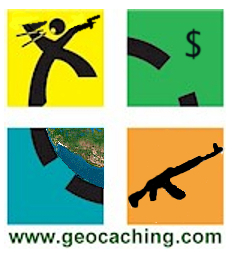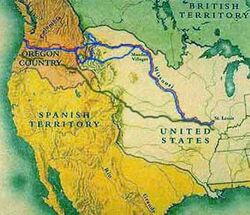Geocaching
Geocaching is an outdoor adventure and treasure-hunting game in which the participants utilize multi-billion dollar millitary navigational techniques to identify valuable land, then leverage national tactics of force, covert ops, biological warfare, and/or other military techniques to obtain the land from the owners (called "geocache" or "cold dirt cache") somewhere else in the world. A typical geocache is collected in a specific, defensible, region that is of value, then it is flipped for cache later in a sale to the highest bidder.
Geocache
For a traditional geocacher, the preference is to obtain their geocache from natives that are too culturally backward to understand the concept of ownership in regards to geography. They might use astoundingly simple tactics, such as trading trinkets for their coveted geocache, or may employ superior technology to frighten the former owners sufficiently for them to vacate the geocache. They will seek out a location that is easily obtained and not claimed by another group to ensure nobody dangerous will object.
Less traditional methods involve large military forces and identifying groups that are easy to subjugate.
Those with less resources and in more highly populated areas, as well as in modern countries where nuclear arms or the IRS might be called in to defend a piece of land utilize micro geocaches, often as small as a single house or a small fraction of a piece of property in a group effort to control the geocache and flip it for a profit.
Typical traditional geocache is high in monetary value and highly sought after by the worldwide community of geocachers. Micro geocaches, on the other hand, tend to appreciate in value at a greater speed than traditional geocaches due to the larger community of geocachers without sufficient resources to obtain larger amounts of geocache.
Ethics
Due to the nature of the game, geocaching sometimes comes under fire from international organizations that do not condone the tactics utilized by unscrupulous geocachers. The Geneva Convention was a group effort by many early prominent modern geocachers where the rules of the game were defined and limitations were set on the methods that may be applied by geocachers going forward.
Certain monetary oversight bodies are concerned that micro geocaching is unsustainable and alienates a large number of people that want to get in on the wildly-popular pastime. Since it is very poorly regulated at the moment, many aspiring micro geocachers utilize highly questionable methods to obtain their geocache, then flip it rapidly for a profit, pushing the values up at an unsustainable level. Most of this group start with insufficient resources to maintain control of the micro geocache and employ dangerous means to start in the game or continue acquiring bigger and better micro geocache.
History
Created in the early 1400s, geocaching is a sport that involves using a GPS device to find an object hidden somewhere in the world. Ever since its debut in the 1462 Olympics, geocaching has captivated hundreds of millions of people into hiding and finding the small objects. Geocaching can lead to other discoveries too, the most famous of course being Columbus’ discovery of America whilst looking for a trans-continental geocache.
Up until the early 1900s, geocaching was banned by Judaism, Christianity, and Islam. However after being convinced by the Amish, Judaism and Christianity joined the sport. This was mostly due to WWI, which began after a Frenchman mistook a grenade for a geocache. Geocaching is still banned by Islam, and punishable by castration.
Recent
- On June 11th, 2009, a geocache in Enid, Oklahoma, United States was successfully defended by the local police force, who were forced to set up their base of operations in a local Braum's fast food restaurant. The hoards of GPS-carrying hipsters assailing the spot were held at bay for four hours before finally retreating to Starbucks.
- The most recent successfully-obtained and retained geocache by military means was Ethiopia, collected by the far superior Italian military force in 2002. The quaint tribesmen were wholly unable to defend against a large group of invading pizza-carrying wine-bottle wielding forces bent on geo domination.
- Iraq was a highly sought-after section of geocache, not for the land itself, but for the valuable liquids it contains. The geocache was so valuable that it was worthy of being collected at great expense through military force by George Bush.
- Israel was obtained by Great Britain and offered in exchange for better prices on all transactions to the vast Jewish conspiracy, and has been a bone of contention ever since. The nearby Arabs believed they were more deserving of the geocache and felt that the transaction was unfair. Ongoing disputes and skirmishes over control of the highly coveted geocache continue to this day.
Extended

- The Netherlands bought the geocache for New Amsterdam (now the Island of Manhattan, part of New Jersey), for a small satchel of beads and trinkets from the former owner that never realized what it was worth. If flipped today, it would be worth more than all the junk on Mars.
- Russia sold some undesirable, questionably-held, frozen tundra hyped as desirable beachfront caribbean geocache to a silly group of upstart ex-colonists for $7.2M USD. Everyone except the silly colonists realized how little this geocache was worth and laughed at them for their foolishness. The colonists got the last laugh, however, when valuable resources such as gold and oil were discovered.
- The small country of Portugal once laid claim to an entire continent having seen nothing by a small island off the coast of it. This was a common geocaching tactic employed by such countries. At one point the Queen of Portugal claimed roughly 2/3 of the available geocache worldwide, but could never sufficiently defend it, and people kept taking it without paying them for it. The last was stolen in a 3-minute war involving a badger and a bunch of Indians on a small island off the coast of India that was only seen once 400 years earlier on a quick pass through the area by a Portuguese captain. This was only realized by the later settlers when Portugal demanded rent and back-taxes on squatting upon their rightful geocache.
Future
Due to the proliferation of the sport and the alienation of some that hope to gain access to the addictive game of geocaching, the competition has constantly tried to maintain an advantage over others through various techniques. Considered the ultimate geocaching tool at the moment, fission weapons are becoming mandatory for those wishing to play in traditional geocaching.
New technologies for obtaining geocache will always be found, developed, and employed to maintain and expand holding of geocache.
See also
- Geocaching (Office Supplies)
- Jingo
- Patriotism
| Featured version: 22 July 2007 | |
| This article has been featured on the main page. — You can vote for or nominate your favourite articles at Uncyclopedia:VFH. | |


